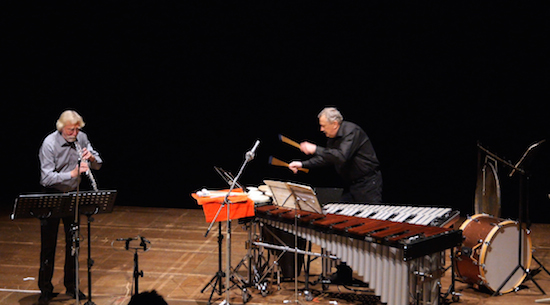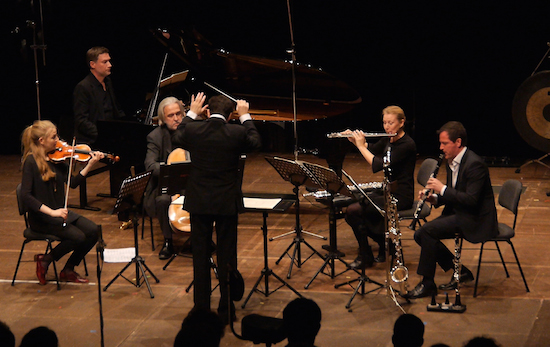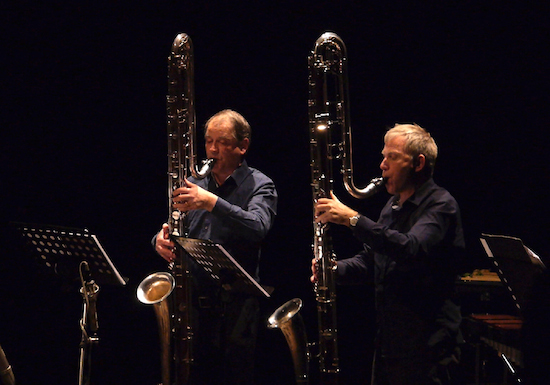There’s something rather unnerving about rocking up to Berghain mid-week early on a winter’s evening. The area seems utterly deserted in a vaguely Tarkovskyian way. The building itself is massive, enormously imposing, and would probably make an ideal location for a dystopian science fiction film. Over the past decade, this former East German power station turned male-only fetish club has become the unlikely "world capital of techno" (Philip Sherburne). But there are no clubbers here tonight. I have come for the first night of the Faithful Festival, the Berlin contemporary music festival that brings to the forefront questions of interpretation and fidelity with regard to source material.
Actually, when I first arrive there’s nobody here at all, and it’s only five minutes before the festival is due to begin. Eventually, a head pokes out of a door and tells me to come back in ten minutes. Half an hour later I am finally admitted, but only to an area that usually serves as no more than a cloakroom.
In the corner, a digital piano has been set up, and every now and then someone will sit before it to struggle manfully through a few measures of Bach before leaving in confounded bemusement. This, it seems, is arch-conceptualist Johannes Kriedler’s installation whose exhibition is due to open the proceedings. Evidently the wily composer has doctored the thing such that the notes sound not when you press a key but when you lift your finger off, thus making it absolutely diabolical to try and play anything. So for the most part, people don’t.
Later in the weekend, Kriedler taunts a succession of professional pianists into making tits of themselves onstage, attempting to play against all their better instincts upon this absolute swine of a keyboard. They all try to look like they’re totally down with the joke. But you can tell that, inside, they want to kill him.

Friday night kicks off with a concert so ill-conceived that it practically beggars belief. Improvisers from Syria, Bulgaria, Korea, Singapore, and Germany are brought onstage as if in belated response to Blue Mink’s 1969 call for "one big melting pot." They are then given headphones and instructed to respond to a set of 90s club bangers spun by DJs Andi and Hannes Teichmann. The idea has something to do with demonstrating "the continuity of trance" across diverse cultures but it just sounds like a big embarrassing mess for all concerned. There’s something deeply dubious about having these diverse, highly trained players, each from incredibly rich and sophisticated musical traditions of their own, forced to try and fit into structures provided by a succession of lame western IDM acts.
Much better is the (1986) Gerard Grisey piece, Talea (Ou La Machine Et Les Herbes Folles), performed later in the evening by the Swedish ensemble Norbotten NEO. The venerable French spectralist’s quintet focuses on those taut and tender sounds at the very edge of each instrument’s range, drifting between cascading flurries of notes and fraught silences, filled with tension. The Norbotten players performed the piece with care and sensitivity. But why they then needed to wheel on another ensemble, immediately afterwards, to play exactly the same piece, only slightly less well, is beyond me.
Of course, I’m being somewhat disingenuous. The whole focus of this festival is on the creative role of the interpreter. The way a piece can be transformed by the people who play it. So on some nights we’re treated to the same, languorous twenty-minute pieces, three times in a row, each time subtly different. A little more aggressive on the attack here, a touch more nutty or woody or supple or spry in tone there. It’s one of those ideas that probably sounded like absolute genius when they thought it up. I can picture them really patting themselves on the back for that one. But my god it’s torture for an audience.
And for what? To labour a point that in any other musical tradition would be so obvious that it would scarcely need stating. What jazz fan would doubt that the singer of a song has the power to change that song, to lift it up to the heavens or bring it crashing down to earth (or even deeper)? But what jazz fan would actually volunteer to spend a whole night listening only to ‘My Funny Valentine’?
Set aside the question of audience pleasure for a moment. After all, as composer Dror Feiler notes in the festival programme, "Music is too serious a matter to limit it to the concept of enjoyment." On a purely conceptual level, the gambit just doesn’t quite work. As readers of French philosopher Bernard Stiegler will recognise, we never hear the same piece of music twice anyway. Did I like the Ensemble Intégrale’s version of Talea less than Norbotten NEO’s because it was played less well or simply because I had already heard it, just a few moments before. The tension of the silences was changed. My expectations were different. They could have played the same performance on a CD twice over and I would have heard the second one differently. Actually, in some ways that might have made for a more interesting festival. The same piece played by the same ensemble. Over and over again. All weekend. If you’re going to go there, go the whole way.

Which is not to say that there wasn’t some excellent music over the course of the weekend. Bart Plantenga’s remarkably original version of 4’33” sounds superb diffused through Charlie Morrow’s surround sound system at the Galerie Mario Mazzoli on Sunday. Clara Iannotta’s string quartet, ‘A Failed Entertainment’, was thrilling performed by the Sonar Quartet on the Saturday at Radialsystem, drawing a fascinating array of unusual sounds and textures by inserting steel washers beneath the violin strings and bowing on polystyrene packing worms, weaving the whole into a complex hocketed rhythm worthy of Pérotin – or Matmos.
Even without pieces like the above, it would all have been worth it for the performance I finally got to see at Berghain that first Thursday night.
From the Sun Ra-like space chant of ‘Japanese Super Heroes’, to the orgy of white noise and screaming that comprises the Airway set at the end of the night, Los Angeles Free Music Society are wild, wonderful, weird, and always utterly compelling. Augmented here by Berlin improvisers like Zeena Parkins, strumming and bowing upon her electronically-enhanced harp, and Burkhard Beins, the LAFMS revisited works recorded in their late 70s / early 80s heyday with a winning mixture of humour and integrity. It’s a curious thing to go back to music recorded quite spontaneously several decades ago and treat those recordings like scores handed down, but when the music is this good and it’s performed with such glee, such lack of pretension, who’s to complain?
Some bands get back together after a decade or so has passed and it feels like microwaved leftovers. With LAFMS, it’s like getting yesterday’s curry, chucking it back in the pot, adding more ingredients, more spice, and turning up the heat. The flavour just gets richer, the sauce thicker, and everything is that little bit more spicy.
<div class="fb-comments" data-href="http://thequietus.com/articles/16823-festival-report-faithful-festival-live-review” data-width="550">


